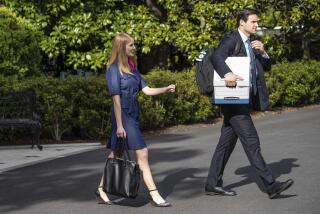Judge to Let Deaver Present Alcoholism Evidence
- Share via
WASHINGTON — Attorneys for former White House aide Michael K. Deaver, who is scheduled to go on trial Oct. 19 on perjury charges, won permission from a federal judge Friday to present evidence to jurors about his bouts with alcoholism.
U.S. District Judge Thomas Penfield Jackson ruled that Deaver’s lawyers could call expert witnesses to testify that the memory of President Reagan’s former deputy chief of staff may have been impaired by excessive use of liquor at the time that he answered questions under oath last year from a House subcommittee and a federal grand jury.
Deaver, who left the White House in May, 1985, after serving more than four years, is accused of lying to investigators about his post-government lobbying activities.
Defense attorneys Herbert J. Miller and Randall J. Turk are expected to introduce evidence that Deaver’s problems with alcoholism, including his hospitalization three times in 1985 and 1986, seriously affected his memory about events critical to the government’s case against him.
Judge Denies Motion
Jackson denied a motion by independent counsel Whitney North Seymour Jr. to exclude evidence about alcoholism.
“When you’re talking about amnesia, you’re talking about something that has a great capability to be faked,” said Marc Gottridge, an associate independent counsel.
However, Jackson ruled that the dispute was “a classic jury question” that can be settled during the trial.
Deaver is charged with lying when he told investigators that he could not recall contacting former Reagan Administration colleagues on behalf of business clients of his public relations firm, Michael K. Deaver & Associates.
Suffers Kidney Failure
Deaver was hospitalized in January, 1985, for kidney failure related to alcoholism, and again in November, 1986, five months after his allegedly perjured testimony before the federal grand jury and the House Energy and Commerce oversight subcommittee, Turk said.
Deaver originally went on trial last July. But Jackson halted the jury selection process after the U.S. Court of Appeals for the District of Columbia upheld contentions by press groups that the screening of potential jurors was unnecessarily secretive.
More to Read
Sign up for Essential California
The most important California stories and recommendations in your inbox every morning.
You may occasionally receive promotional content from the Los Angeles Times.













